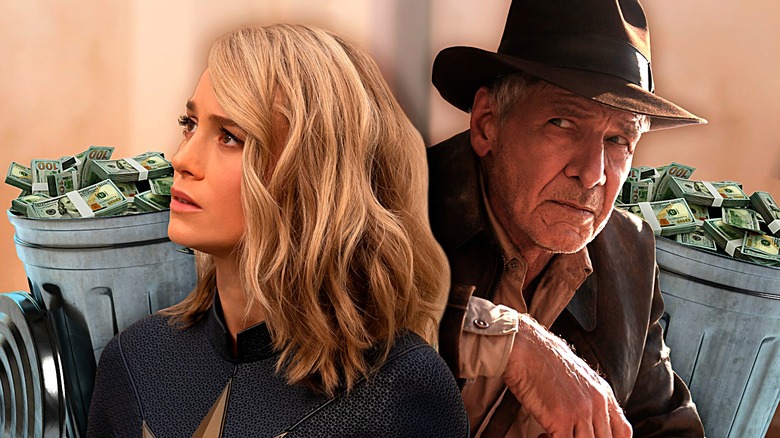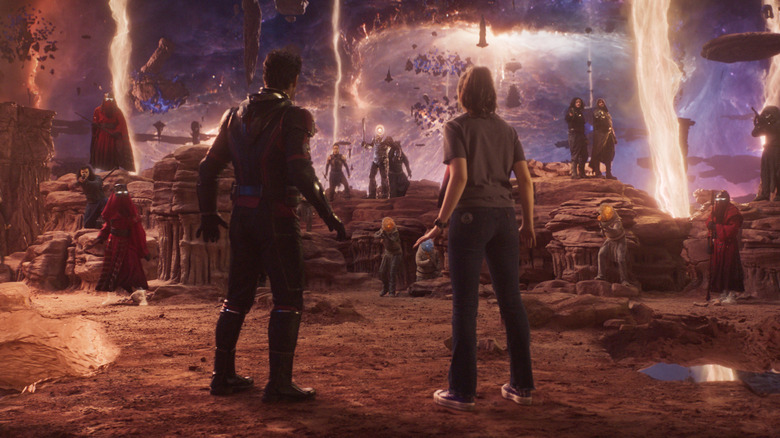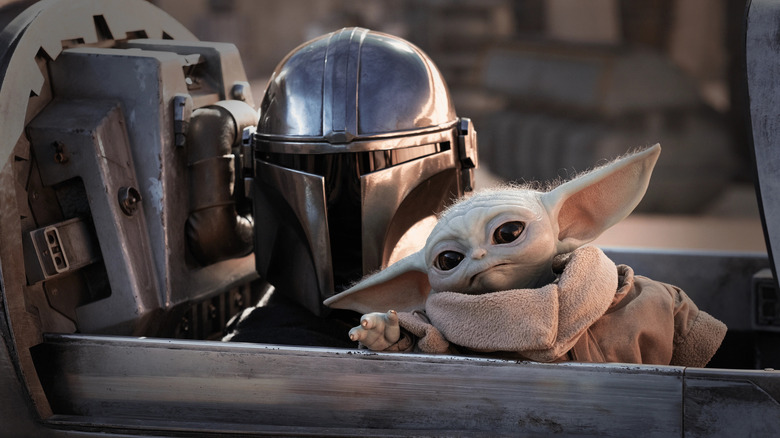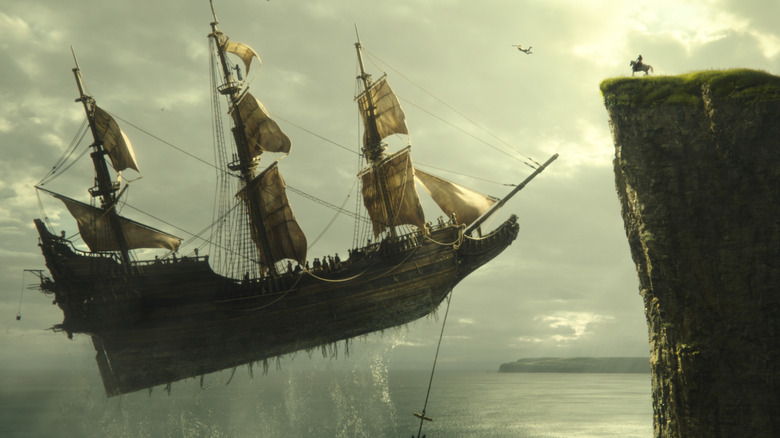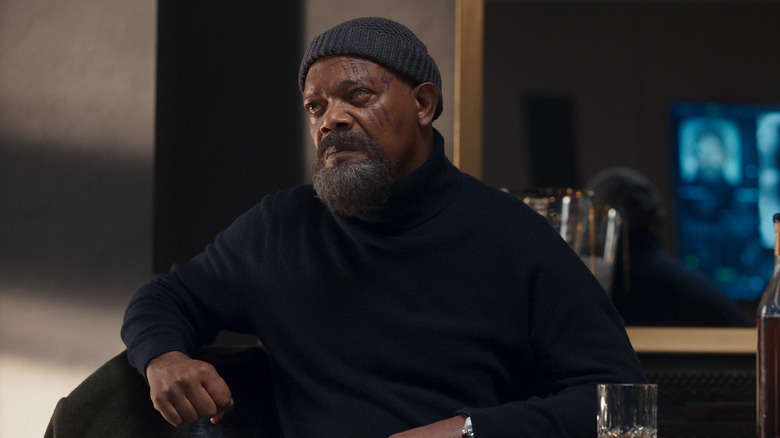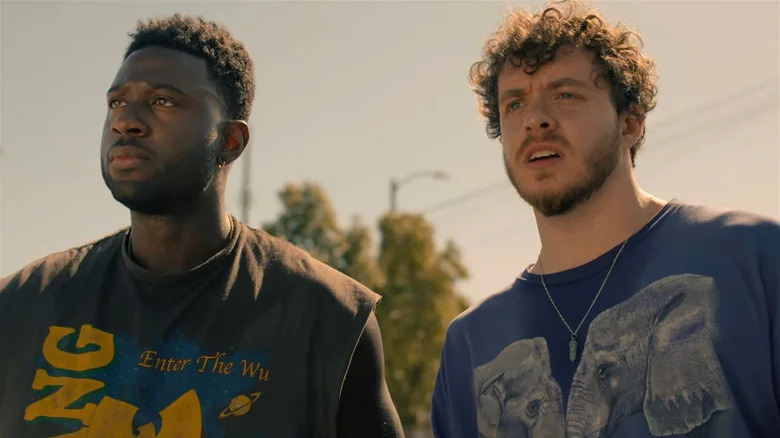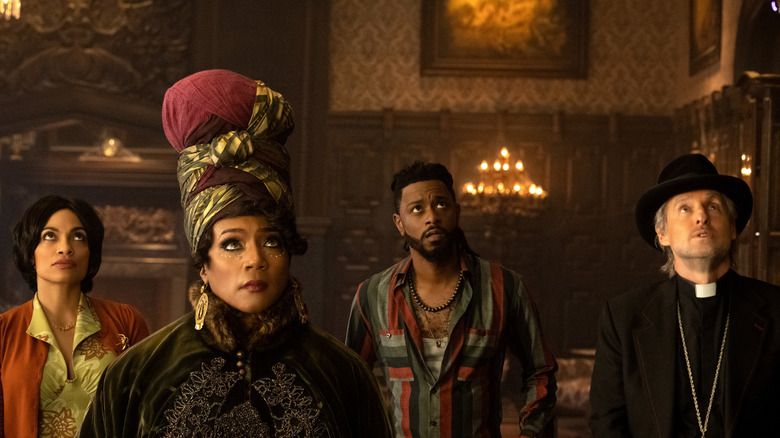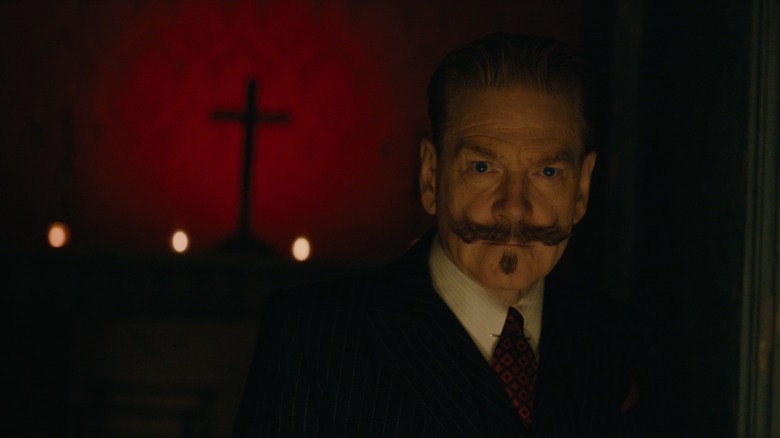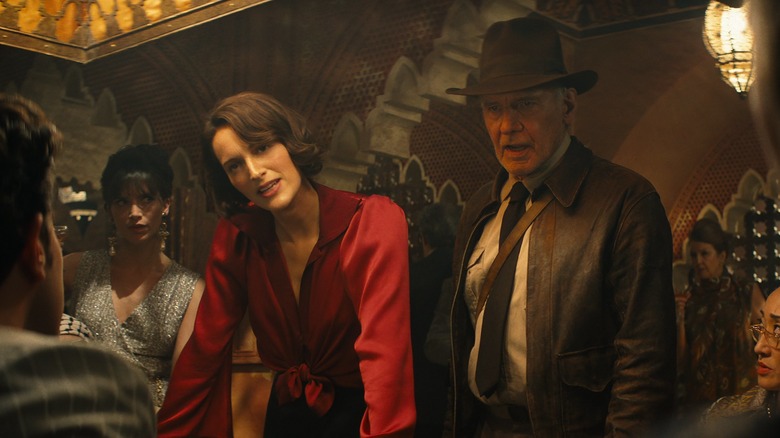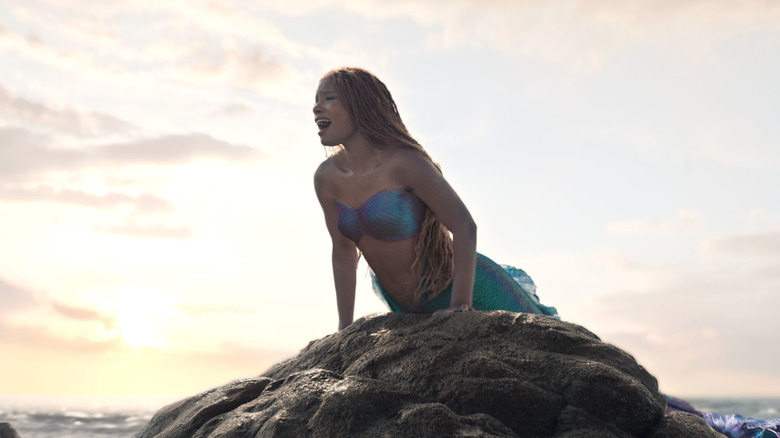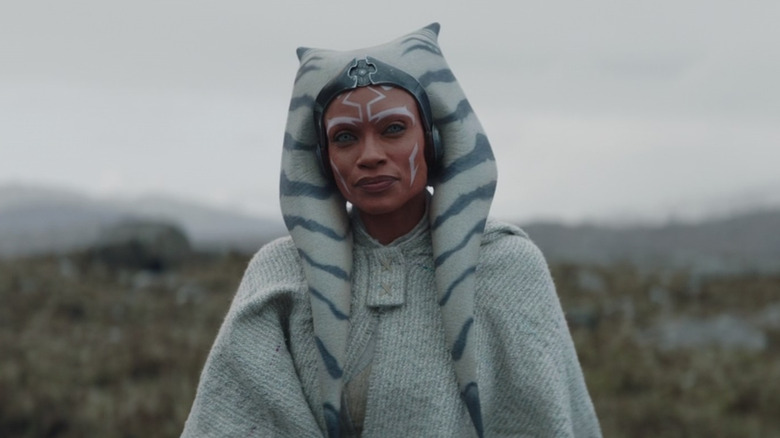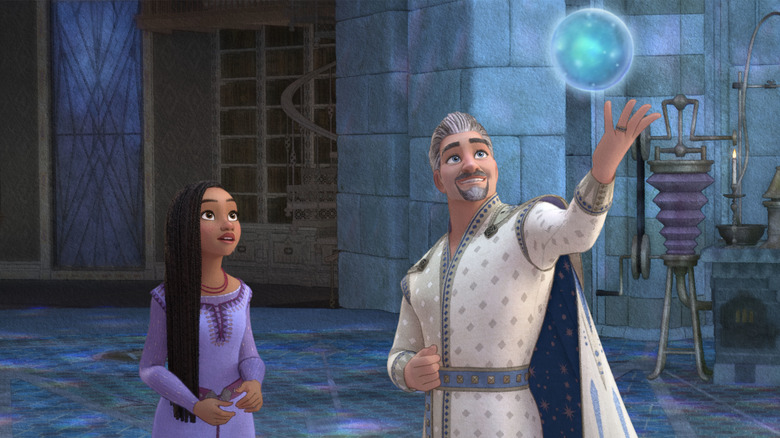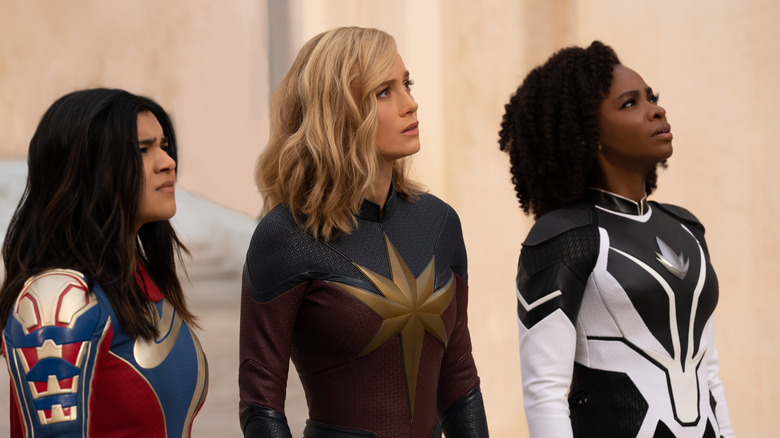Disney's Historic Year Of Movie And TV Show Bombs Explained
It's been a rough year for Disney. In addition to the lingering chaos of the company's politically beleaguered 2022, the company's stock price has dropped significantly, while Disney+ has continued to struggle despite the gargantuan sums of money poured into it. The return of Bob Iger at the end of 2022 signaled a potential resurgence, but the once-and-future CEO quickly torpedoed his own public image, making himself an outspoken enemy of the Hollywood unions during the 2023 WGA and SAG-AFTRA strikes. And to top it all off, this year's release calendar has been a constant stream of critical flops and box office bombs.
There have been some high points. "Elemental" bounced back from what looked like certain doom thanks to a long theatrical tail, "Guardians of the Galaxy Vol. 3" wrapped up one of the MCU's most popular subseries in stellar fashion, and "Loki" Season 2 gave Disney+ something to be proud of. But overall, Disney has struggled severely at both the box office and on Disney+, failing to retain the audience interest you'd expect for such an industry titan.
Why the downturn across so many different projects and properties? Part of the answer surely lies in an overall franchise fatigue — a decline in passion for brands like Marvel and "Star Wars" that's been accompanied by a collapse in quality. The company's complicated public image certainly plays a role as well. For a more complete explanation, we're going through some of Disney's biggest 2023 releases and exploring what really went wrong.
Ant-Man and the Wasp: Quantumania
Looking back, "Ant-Man and the Wasp: Quantumania" was a striking prediction of Disney's year in totality when it was released in theaters on February 17. From the jump, the film seemed ill-conceived: the end of a trilogy that wasn't really a trilogy for perhaps the MCU's least popular superhero. Yet this bizarre concept was meant to usher in Phase 5 of the franchise, introducing a new Thanos-level antagonist in Kang the Conqueror and setting up years of movies to come.
Instead, it grossed $476 million on an estimated budget of $200 million. That might sound like a decent take at first, but remember that production budgets don't reflect marketing costs or a whole host of other expenses. "Quantumania" needed to make about $600 million just to break even. On top of the financial failure, critics hated it, pushing the Rotten Tomatoes critical score to a dismal 46% approval — the lowest of all movies in the entire franchise to date.
Criticisms were leveled against the movie's lackluster script, dismal visual effects, and strange tone. This was supposed to be the grand return of the MCU, following the disorganized chaos of Phase 4 and the COVID-19 pandemic. Instead, we got a goofy mess that's way, way too long. As if that weren't enough, Kang actor Jonathan Majors was hit with domestic abuse allegations soon after the film's release. Though his legal proceedings are ongoing, Marvel Studios seems poised to pivot away from its original Kang plan.
The Mandalorian Season 3
The Disney era of "Star Wars" stewardship has been a bit of a mixed bag. Any fan big enough to know what Sullust is will be intimately familiar with the drama, the highs and lows, and the fractious divisions in the fandom, but "The Mandalorian" Season 1 is perhaps the most universally beloved installment since Disney took over the franchise, right up there with "Rogue One," "The Force Awakens," and "Andor." While Season 2 wasn't quite as popular, it still made a huge splash and delivered plenty of memorable moments.
The third time, however, turned out not to be the charm for "The Mandalorian." Season 3 starts out on bizarre ground by reversing the emotional finale of Season 2, putting Grogu right back in the seat of a new ship with Din Djarin (Pedro Pascal) despite previously being handed off to Luke Skywalker. If you didn't watch "The Book of Boba Fett" — and many didn't — you'd have no idea how Grogu got back or where the new ship came from. Of course, you only had a little while to ponder those questions before the poor pacing, muddled plotting, and lackluster sets of "The Mandalorian" Season 3 began to submerge you in mediocrity.
Viewership dropped, and while critics praised the first couple of episodes, ratings quickly sank as well, and fans decried the show's plummeting quality. While never exactly awful, "The Mandalorian" Season 3 marked a severe dropoff for one of Disney's few consistent "Star Wars" projects.
Peter Pan and Wendy
Everything has become a franchise to Disney over the last decade. Even the unconnected collection of animated classics that built the reputation of the company has been morphed into a regurgitated amalgam of live-action remakes. A select few of these "re-imaginings" have been solid movies, but by and large, they've come off as hollow cash grabs that lack the magic of their source material.
In April 2023, Disney released "Peter Pan and Wendy" on Disney+, yet another retelling of the beloved fairy tale. Though critics gave it a middling pass, viewers lambasted it, sinking the film to an abysmal 11% audience approval score on Rotten Tomatoes — the lowest ever at the time for one of Disney's live-action remakes. "Peter Pan and Wendy" had no theatrical release, and its streaming numbers weren't exactly mammoth. While it's far from the biggest flop or worst film Disney put out this year, it's one more link in the chain of failure.
Secret Invasion
After the dismal performance of "Ant-Man and the Wasp: Quantumania," Marvel Studios had a brief return to glory in May 2023 with "Guardians of the Galaxy Vol. 3." The highly anticipated and critically acclaimed threequel returned some excitement to the MCU, and with Samuel L. Jackson himself heading up the next Disney+ series, "Secret Invasion," hopes were high that the franchise might be getting back on the right track.
Unfortunately, those hopes were quickly dashed. "Secret Invasion" was hit from the jump with controversy surrounding its AI-generated opening credits. Many viewers decried the choice, reflecting growing convictions at the time that AI technology was inherently theft designed to push artists and writers out of work. Given the way Disney has historically treated its visual effects artists, it wasn't a difficult accusation to make.
Of course, things might have settled down had the show been of actual quality. Instead, we got a lackluster spy thriller with a ton of new characters but very little substance. Critics weren't impressed, and the show got some of the worst viewership numbers in MCU streaming history. You can see the potential right beneath the surface — the hard-hitting drama about refugee crises and xenophobia that could have been a critical win for Marvel. Instead, we got a show that seemed terrified of its own inherent politics, and the combined powers of Jackson and Ben Mendelsohn weren't enough to save it.
White Men Can't Jump
It's a world of remakes, reboots, and rehashes, and we're all just living in it. "White Men Can't Jump" is far from the worst studio regurgitation we've seen in recent years, but that doesn't make it good. In fact, almost nothing about it makes it good. Everything about it just makes it ... meh.
Look, Jack Harlow is very charming in interviews. But he's not Woody Harrelson, nor is Sinqua Walls Wesley Snipes. The original film is so steeped in the streetball culture of the early '90s — an era when Michael Jordan was at his peak and basketball was becoming a truly global sport — that's it hard to recreate the same format in 2023 and have it work.
While fans have been a bit kinder to the remake, critics blasted it. "The new movie feels about as genuine as a bad team claiming innocence as it tanks for lottery position," Rolling Stone reviewer Chris Vognar wrote, and it's true. Robert Daniels of RogerEbert.com called it "as unimaginative as it is corny, as dull as it is cheap, and as unfulfilling as any cash grab for a well-known property could be." As a Hulu exclusive, "White Men Can't Jump" got no help from the box office, and despite a marketing campaign that was impossible to miss, its streaming numbers weren't exactly stellar.
Haunted Mansion
Though most critics hated Disney's "Haunted Mansion," it's far from the worst movie on this list. In fact, it has a spectacular audience score of 84% on Rotten Tomatoes at the time of this writing — a far cry from its 37% critical aggregate. Many viewers have praised the film for its fantastic ensemble cast (led by yet another spectacular performance from LaKeith Stanfield), whimsical tone, and visual flair. It harkens back to the family adventure films of the early 2000s in the best of ways, but unfortunately, that sense of retro fun wasn't enough to garner good reviews or box office success.
On a reported budget of $150 million, "Haunted Mansion" made only $117 million worldwide, failing to even recoup its production costs. It also had the unfortunate fate of being released just a week after "Barbie" and "Oppenheimer," the undisputed movie event of the year. "Haunted Mansion" deserved better. If you missed it this summer, give it a watch with the family on Disney+.
A Haunting in Venice
Back-to-back hauntings? In this economy? It's more likely than you think. Like "Haunted Mansion," "A Haunting in Venice" is actually a pretty fun movie if you go in with the right expectations. It takes the familiar formula from Kenneth Branagh's previous two Agatha Christie adaptations — "Murder on the Orient Express" and "Death on the Nile" — and injects it with spooks. Tina Fey's performance as Ariadne Oliver gives Branagh's Hercule Poirot a fun foil to bounce off, and the movie effectively blends light horror with its murder mystery.
Unfortunately, a solid concept, strong cast, and good reviews from both critics and viewers weren't enough to launch "A Haunting in Venice" to success. With a worldwide box office take of just over $122 million, it became the lowest-grossing entry in the trilogy and fell short of earning the 2.5 x its production budget generally required for a film to break even (despite a relatively small price tag of just $60 million). Since it was produced by 20th Century Studios, many may not think of "A Haunting in Venice" as a true Disney movie, but it's yet another release from the company that failed to make a splash in 2023.
Indiana Jones and the Dial of Destiny
After the catastrophe that was "Indiana Jones and the Kingdom of the Crystal Skull," bringing the intrepid archeologist back again looked like an iffy proposition. And with Harrison Ford now in his 80s, the idea of another movie would seem hardly feasible. But of course, when there's a franchise on the line, Disney will pull out all the stops — including a ridiculous $300 million budget that, realistically, was never going to be worth it.
"Indiana Jones and the Dial of Destiny" is certainly better than its direct predecessor, and there's plenty to like about it. Director James Mangold manages to extract a good amount of that retro adventure serial flavor, Ford is still a commanding presence, and the addition of Phoebe Waller-Bridge in the sidekick role is a great one. But despite all that — and decent reviews — it's hard not to see the film as a symbol of the larger IP problem at Disney. Just as Indy's face is artificially made younger with CGI, doubles, and masks, so too does "Dial of Destiny" feel like the facade of newness stretched over a dusty mannequin.
There's nothing wrong with nostalgia. But there is a problem when new ideas and bold risks are eschewed in favor of overly expensive legacy sequels time and again. With a global box office haul of just under $384 million, "Dial of Destiny" made back its whopping production budget but fell woefully short of breaking even.
The Little Mermaid
There's an argument to be made that "The Little Mermaid" doesn't belong on this list at all. It wasn't a box office bomb, it got solid (though not spectacular) reviews, and Halle Bailey is absolutely phenomenal in the leading role as Ariel. It's worth seeing for her performance alone, even though the film suffers from many of the same weird adaptation choices as Disney's other live-action remakes.
But while the movie didn't bomb, it also barely turned a profit, falling drastically short of live-action hits like "Aladdin," "Beauty and the Beast," and "The Lion King." "The Little Mermaid" needed about $560 million to break even, and it just barely squeezed past that mark with a global box office gross of $569.6 million.
It's no bomb, and it's a perfectly fine movie, anchored (pardon the pun) by a true rising star in Bailey. But it also feels indicative of the larger year that Disney has had. Even when the studio got the casting right and put out a movie that most people liked in 2023, the odds didn't seem to be in Disney's favor. Blame it on remake fatigue, or the online "controversy" over the color of Ariel's skin sparked by racist trolls, or a general drop in Disney's reputation, but "The Little Mermaid" is the kind of Disney movie you'd expect to make a bigger splash (sorry, again) in any other year.
Ahsoka
After the disappointment of "The Mandalorian" Season 3, all eyes went to the next big "Star Wars" series — a show that would bring a ton of animated characters to live-action and put longtime Lucasfilm creative Dave Filoni in the live-action driver's seat for the first time.
"Ahsoka" is, if nothing else, interesting. It's a strange and altogether unwieldy collection of things, serving as a direct follow-up to "Star Wars Rebels," a legacy sequel to "The Clone Wars," and a continuation of the "Mandalorian" story, all at the same time. Unsurprisingly, the series crumples under its own weight more than once, and the pacing and production values are all over the place. But there are definite highlights. Eman Esfandi and Lars Mikkelsen steal the show as Ezra Bridger and Grand Admiral Thrawn, respectively. The lightsaber fights are exciting and plentiful, Kevin Kiner's score is amazing, and the supporting villain performances — by Ivanna Sakhno (as Shin Hati), Diana Lee Inosanto (Morgan Elsbeth), and especially the late, great Ray Stevenson (Baylan Skoll) — are stellar.
All in all, though, Ahsoka comes out somewhat mixed. Viewership was down from "The Mandalorian" Season 3, which had already dropped off from early installments. Though reviews for the early episodes celebrated the show's potential, they fell off by the end, with episodes demanding too much prior franchise knowledge and failing to create anything compelling for new fans. Diehards will continue to rewatch that Hayden Christensen Clone Wars flashback episode (and it is quite fun), but occasional nostalgia wasn't enough to save "Ahsoka."
Wish
At the time of this writing, Disney's "Wish" is still in theaters, but it doesn't seem likely to have the same comeback story that Pixar's "Elemental" had earlier in the year. With a production budget close to $200 million, the studio's latest animated feature has yet to crack $100 million in worldwide gross. It holds less than a 50% approval rating from critics on Rotten Tomatoes, and though the audience score is much higher at 81%, those kindly ratings aren't making the movie any more of a financial victory.
The animation looks nice, but it also fails to stand out in a year when "Spider-Man: Across the Spider-Verse," "The Boy and the Heron," and even "Teenage Mutant Ninja Turtles: Mutant Mayhem" have done more interesting things visually in the medium. And even with a strong voice cast, the characters and world just don't feel as alive as other recent animated hits like "Moana" or "Encanto."
To top it all off, "Wish" ends with some bizarre connections to a bunch of Disney animated classics. While these moments can be seen as simple Easter eggs, many have called them out as yet another gross example of everything needing to be a franchised cinematic universe these days. Regardless of how you feel about the ending, it's not going to make "Wish" any more memorable down the line.
The Marvels
"The Marvels" is, unfortunately, both an apt way to close out this list and a fitting finale for Disney's 2023. Despite what people who are terrified of women starring in movies might say, "The Marvels" is a fun watch. It reviewed well enough with critics, and very well with fans. It's a lighthearted, colorful, breezy superhero story with a great core trio at its heart and a star-making performance from Iman Vellani. And it is, in spite of all that, the biggest box office bomb in the history of the MCU.
On a budget of more than $250 million, "The Marvels" has grossed less than $200 million worldwide at the time of this writing. It's not even the worst MCU project of the year (far from it), but it shows a dwindling interest in the franchise and, depending on who you ask, a lack of direction from Disney. Part of the problem may well be that many casual moviegoers simply don't understand the MCU at this point. A sort-of-sequel to "Captain Marvel" with two new protagonists from the Disney+ shows and no apparent connection to the larger story? That's hard to wrap your head and cash around.
The sad part is that "The Marvels" doesn't demand that much prior knowledge to enjoy it. Unlike other entries on this list like "Quantumania" or "Ahsoka," it works perfectly well as a one-off story about female friendship and facing mistakes. Director Nia DaCosta deserved better. Brie Larson deserved better. Teyonah Parris and Iman Vellani deserved better. But in 2023, Disney hasn't gotten better. It's gotten worse.
